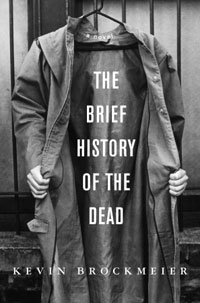| ||
A portrait of eternity by Joe Foster The Brief History of the Dead by Kevin Brockmeier. Pantheon Books, 2006. 252 pages. Maybe one of the saddest things about life is that the only thing that really ties humanity together, the one constant, the one commonality, that one last great truth, is the fact that we all die. (Except the vampires, of course, but I’m not sure if they can be included in “humanity.”) It’s difficult to reconcile oneself to the fact that all the joys and miseries that are life will inevitably one day just stop. I feel like the idea of religion stems from the fear that this is, indeed, our one chance to get things right. How terrifying to imagine that the foggy decisions and random mishaps of life really are all that there is to this. It is this insecurity that leads one to the urgent hope for more, that fervent prayer sent up to the cosmos that one lasts for eternity. Philosophies surrounding this hope spring up, seeking to define what eternity may look like. These philosophies are discussed, refined and spread, eventually becoming dogma and creating organized religion. From the idea that life simply isn’t enough come the forces that dominate society. It is unavoidable that different people and different cultures will create a series of different philosophies about such a personal and abstract concept. Actually, something funny: I saw on the back cover of a random book the other day that the author was an “expert” on afterlife studies or something. The arrogance is numbing, isn’t it? Almost as bad as those books that claim to be able to show you, in 10 easy steps, how to be enlightened in this lifetime. Sorry, but anyone that would write a book like that has nothing to teach you. In contrast, Kevin Brockmeier’s The Brief History of the Dead is one of the most interesting ideas of what an eternity may consist of as I’ve ever seen.
The novel is based on an idea from an African mythology that humans can be divided into three categories: the living, the recently departed and the dead. You stay in the recently departed category until the last person that knew you in life dies; as long as you are remembered, you exist between life and death. In the novel, these recently departed souls reside in a city much like any other city in the world. They have jobs, and pretty much exist as they would in life. Every once in a while, a soul will simply disappear, meaning that the last living person that knew him or her had died and were now residents of the city themselves. Interestingly enough, in this state, there is much trepidation about what happens when you die after your death. The residents of this city start to notice a dramatic decline in the population, and have no real answer to why that would be. We’ve all wondered how the world will end. Chances are, though, that it won’t but we will. In The Brief History of the Dead, humanity is ended by a greedy corporate cover up, which is realistic enough, by that most widely disseminated of capitalist products, Coca-Cola. Something happens, a poison is spread, and the population of the world slowly, at first, and then very quickly is wiped out once the poison becomes airborne. Scary stuff. It turns out that the last person alive on the planet is a young woman helping a research team in Antarctica. As the team dies around her, the residents of the post-life city gather and determine who it is that they all have in common. Some collectively pray to her and her continued life, while others pessimistically prepare themselves for the end; and so a new religion is born. Brockmeier does some truly fascinating things with this concept, and creates some really great characters and a pretty edgy plot to illustrate it. I picked up this book because it has probably the coolest cover I’ve ever seen and was pleasantly surprised that the book inside was one the most entertaining and fascinating reads that has come by in a while. •
|


